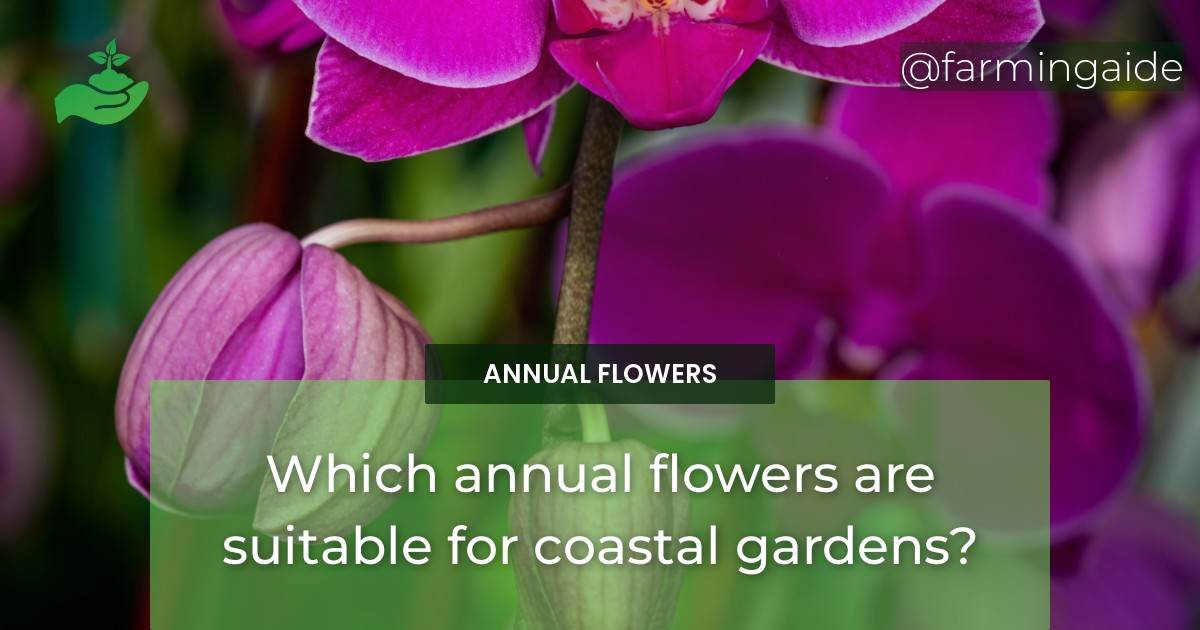Coastal gardens can be challenging to maintain due to the harsh environmental conditions. However, with the right choice of annual flowers, you can have a vibrant and colorful garden that can withstand the salt spray, wind, and sandy soil. In this article, we will explore the best annual flowers for coastal gardens, the factors to consider when choosing them, and maintenance tips to keep them healthy and blooming.
Best Annual Flowers for Coastal Gardens
Petunias
Petunias are ideal for coastal gardens due to their tolerance to salt spray, wind, and full sun exposure. They produce charming, trumpet-shaped flowers that come in a range of colors, from white to pink, red, purple, and blue.
Marigolds
Marigolds are hardy annuals that can tolerate a wide range of soil conditions, including sandy soil. They produce daisy-like flowers in orange, yellow, and red hues, which can attract beneficial insects to your garden.
Zinnias
Zinnias are another popular choice for coastal gardens, thanks to their resistance to salt spray and wind. They produce vibrant, daisy-like flowers in a variety of colors, from bright pink and orange to deep red and purple.
Salvia
Salvia is a heat-tolerant annual that thrives in full sun and well-drained soil. They produce spikes of small, tubular flowers in shades of blue, purple, pink, and white.
Lobelia
Lobelia is a low-growing, spreading annual that can withstand coastal conditions. They produce delicate, fan-shaped flowers in shades of blue, white, and purple, which can add a pop of color to your garden borders or hanging baskets.
Alyssum
Alyssum is a charming annual that produces fragrant, tiny flowers in shades of white, pink, and lavender. They prefer well-drained soil and full sun exposure but can tolerate some shade.
Portulaca
Portulaca is a drought-tolerant annual that thrives in hot and dry conditions. They produce colorful, cup-shaped flowers in shades of pink, orange, red, and yellow. They are an excellent choice for rock gardens, hanging baskets, or as ground cover.
Factors to Consider when Choosing Annual Flowers for Coastal Gardens
Salt Tolerance
Coastal gardens are exposed to salt spray, which can damage plants’ foliage and roots. Therefore, it’s crucial to choose annual flowers that can tolerate salt spray. Look for plants that have adapted to coastal environments, such as beach grass, succulents, and seashore plants.
Wind Tolerance
Coastal areas are often windy, which can lead to broken stems, damaged flowers, and stunted growth. Choose annual flowers that have sturdy stems and can withstand strong winds. Alternatively, you can provide some shelter for your plants by planting them close to a wall or fence.
Soil Preference
Coastal soil is often sandy, which can drain quickly and lack essential nutrients. Look for annual flowers that can thrive in sandy soil, such as marigolds, zinnias, and portulaca. Alternatively, you can improve your soil’s quality by adding organic matter, such as compost or manure.
Watering Needs
Coastal gardens can be challenging to water due to the sandy soil’s fast drainage and wind’s drying effect. Choose annual flowers that have low to medium watering needs, such as petunias, marigolds, and alyssum. Alternatively, you can use mulch to retain moisture in the soil and reduce water evaporation.
Sunlight Requirements
Coastal areas often have full sun exposure, which can be beneficial for some plants but can also lead to sunburn and heat stress. Choose annual flowers that can tolerate full sun exposure, such as petunias, marigolds, and salvia. Alternatively, you can provide some shade for your plants by using a shade cloth or planting them under a tree.
Maintenance Tips for Annual Flowers in Coastal Gardens
Deadheading
Deadheading is the practice of removing spent flowers to encourage new blooms and prolong the flowering season. It’s essential to deadhead your annual flowers regularly, especially in coastal gardens, where the growing season can be short.
Fertilizing
Coastal soil can lack essential nutrients, such as nitrogen, phosphorus, and potassium, which are essential for plant growth and flowering. Therefore, it’s crucial to fertilize your annual flowers regularly, using a balanced fertilizer that contains all the necessary nutrients.
Mulching
Mulching is the practice of applying a layer of organic matter, such as bark chips or straw, to the soil surface around your plants. Mulch can help retain moisture in the soil, suppress weed growth, and regulate soil temperature. It’s an excellent practice for coastal gardens, where soil erosion can be an issue.
Pest Control
Coastal gardens can attract a variety of pests, such as aphids, whiteflies, and spider mites, which can damage your plants’ foliage and flowers. Therefore, it’s essential to monitor your plants for pests regularly and take appropriate measures, such as using insecticidal soap or neem oil.
Watering
Coastal gardens can be challenging to water, as the sandy soil drains quickly, and the wind can dry out your plants. Therefore, it’s essential to water your annual flowers regularly, using a slow and deep watering method. Alternatively, you can use a drip irrigation system to deliver water directly to your plants’ roots.
Can Annual Flowers for Tropical Gardens also thrive in Coastal Gardens?
Yes, the best annual flowers for tropical garden can also thrive in coastal gardens. These flowers, known for their vibrant colors and ability to withstand heat and humidity, are also well-suited for the coastal climate. With proper care and maintenance, they can add beauty to any coastal garden landscape.
Conclusion
Coastal gardens can be a beautiful and rewarding experience, with the right choice of annual flowers and proper maintenance practices. When choosing your annual flowers, consider their salt tolerance, wind tolerance, soil preference, watering needs, and sunlight requirements. Regular deadheading, fertilizing, mulching, pest control, and watering can keep your annual flowers healthy and blooming throughout the growing season.


